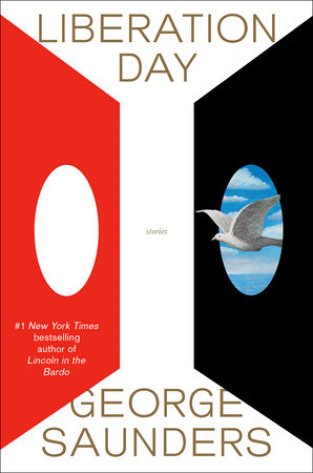Review | ‘Liberation Day’ by George Saunders
A Short Story Master at Work

If you read Tenth of December or Lincoln in the Bardo, you know that George Saunders isn’t afraid to challenge readers and make them work. Unless the writer is a consummate master of craft and form, this is risky, but with Liberation Day, Saunders proves his mastery once again. The nine stories in this latest collection are all different, though readers of Saunders’s previous books will recognize the juxtapositions of pathos and strangeness, humor and inventiveness, violence and empathy.
Lincoln in the Bardo has a narrow aperture, and I remember thinking as I read the first few pages, “Where in the world are you going with this, George?” I had a similar reaction reading “Liberation Day,” a sense of confusion and a feeling of being unbalanced. Human beings stuck to a Speaking Wall, operated like puppets for the pleasure and entertainment of Mr. U and his friends? Why? And to find that they volunteered to be stuck to the wall! It’s vintage Saunders: weird and dark yet dappled with light, familiar yet bizarre, with several twists, as when Mr. U’s captive/volunteer performers act out Custer’s Last Stand. “Where is Custer? we Speak, we Sing.”
In “Love Letter,” a grandfather writes to his grandson, who appears to be wrestling with a decision that may land him on the wrong side of a political regime. When the grandfather writes, “We had taken, in other words, a profound gift for granted. Did not know the gift was a fluke, a chimera, a wonderful accident of consensus and mutual understanding,” I gathered he was lamenting the loss of democracy and freedom precipitated by a Trump-like figure. The grandfather tries to justify his actions, or inaction, in the face of the collapse of an order that had seemed like oxygen. Although the grandfather did what responsible individuals do, it wasn’t enough, and in some ways the letter is an apology. “I wish with all my heart that we could have passed it all on to you intact.”
Saunders clearly reveres the short-story form and obviously enjoys tinkering with it to see what he can make it do, what its boundaries and tolerances are. Aside from his imagination and daring, I admire his opening sentences, like this one from “Ghoul”: “At noon Layla wheels over Vat of Lunch,” and “Who would sell a gem like that?” from “My House.” Saunders’s opening lines are spring-loaded launch pads. “Elliott Spencer” begins this way: “Today is to be Parts of the Parts of my” and the entire story is written in this odd syntax, as if synapses are misfiring. “She was small and slight and her eyes were dark beads on either side of a beaklike nose” opens the story “Sparrow.”
In A Swim in a Pond in the Rain, Saunders describes short stories as “fastidiously constructed scale models of the world” and I think he has achieved such models with the stories in Liberation Day. Each is a little universe of its own. For me, reading George Saunders is like listening to John Coltrane; I continuously find myself marveling at the notes he can conceive.
This review originally appeared in the California Review of Books.




You must be logged in to post a comment.